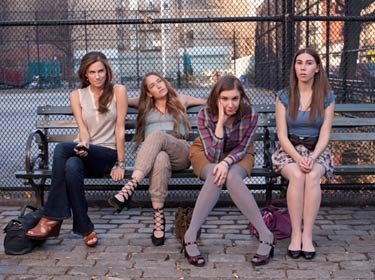Betsey Woodruff, in National Review, identifies Lena Dunham’s HBO comedy Girls as a cultural canary-in-the-coal-mine which, if observed carefully, could have told you where the recent presidential election was heading.
At its core, Girls feels like a deliberate, dissective examination of a group of people who stubbornly refuse to grow up and are lucky enough to be able to pull it off. The main thing Dunham’s characters share is the idea that just because they exist, somebody else should give them stuff. In and of itself, depicting that isn’t at all a bad thing. Girls is an interesting project, it’s well executed, and it can be really, really funny. Look, I like Girls, and I’m excited about the second season.
But Dunham’s stupid little YouTube ad for the president might have ruined it all for me. That’s because she sounds like she’s channeling her character, Invasion of the Body Snatchers–style. They share the same baffling, naïvely egomaniacal understanding of justice — they both seem to think that because they exist, the universe needs to make sure that all the sex they choose to have is consequence-free.
You can almost argue that Lena Dunham sees President Obama as the perfect surrogate for everything missing in her characters’ lives: He’s their gentle lover, supportive parent, and empathetic friend. He’s special. He won’t let them down. He’s Prince Charming. And that kind of defeats the purpose of feminism.
You’d think the feminist elevation of agency would result in women who take pride in being responsible for their own bodies. You’d hope that telling women that they can do whatever they want would imply that they’re responsible for what they do. You’d think serious feminists would argue that true empowerment is something you lay claim to, not something the federal government dispenses in all its benevolence. But for Dunham, that doesn’t seem to be the case.
In fact, for all practical purposes, the patriarchy no longer decides whom American women can sleep with and when. That’s great. But if you don’t want men in Washington telling you how to use your sexuality, you shouldn’t expect them to subsidize it. But Dunham seems to actually believe they should. Dunham makes tons of money, and I’m quite confident she can afford to pay for her own birth control. But she doesn’t seem to take pride in that; it’s not what her characters aspire to, and given her foray into the delightful world of presidential-election ads, it doesn’t seem to be something she aspires to, either.
Second-wave feminists lionized the independent woman who paid her own rent and busted through glass ceilings and ran for Congress. Being totally self-sufficient was the goal. The idea was that women didn’t need men, whether those men were their fathers or husbands or boyfriends or presidents. By contrast, Dunham’s new vision of women as lady parts with ballots is infantilizing and regressive.
So Girls isn’t the eschaton, and neither is one vapid YouTube video. But if Dunham’s show were a metaphorical canary in a metaphorical coal mine, it would be struggling pretty hard right now. There’s a reason it’s called Girls, not Women.






brazil football team
bresil maillot
Please Leave a Comment!